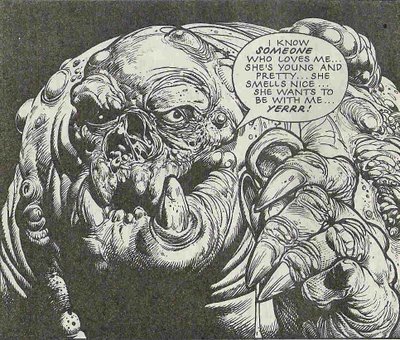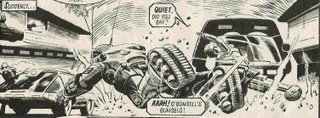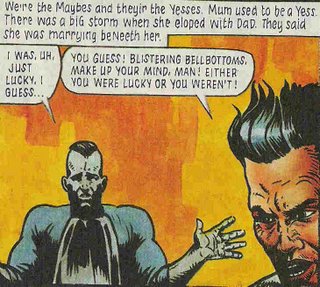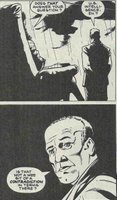A quick tour of British humour
 ... that's you, that is.
... that's you, that is. OK, so that joke's probably only funny if you were watching TV in the UK in 1991/2. But with that in mind, I'm going to take you on a small journey through a bit of comedy via the medium of 2000 A.D. Sorted by type of joke, since cataloguing makes everything inherently funnier. Oh, wait, that's the opposite of true. Tough. Here we go...
 The straightforward 'joke' joke. It's so obvious why this is funny that I can't even explain it. Foreign editions of Robo-Hunter: Day of the Droids would have no trouble translating this joke.
The straightforward 'joke' joke. It's so obvious why this is funny that I can't even explain it. Foreign editions of Robo-Hunter: Day of the Droids would have no trouble translating this joke.Next, the simple pun. Not really a joke, but you can tell that the writer was pleased with himself when he snuck this one past his editor. (Who happened to be called K. Gosnell, for 10 extra trivia-joke points)

 And the more elaborate pun, again involving comedy names, but this time it's actually funny. Could add an extra 5 points for the bad PJ Maybe spelling involved. Not really funny, but it sets up the whole story as a comedy.
And the more elaborate pun, again involving comedy names, but this time it's actually funny. Could add an extra 5 points for the bad PJ Maybe spelling involved. Not really funny, but it sets up the whole story as a comedy.Moving on to a trivia joke:
 This seems to me to be obviously a joke, but if you don't know who Heisenberg is, you won't get it. (Professor who came up with the 'uncertainty principle'. A nicer blog would have a wikipedia link here). These jokes get extra points for making you feel good about yourself if you get them, because you can smile at your own cleverness whilst laughing at the joke. Alan Grant loves these jokes, and good on him for that. I have this racist idea that an American writer wouldn't use this kind of joke, or at least would feel the need to set it up so that every reader could get it, thus rendering it extremely unfunny. Which leads us into: jokes at Americans' expense.
This seems to me to be obviously a joke, but if you don't know who Heisenberg is, you won't get it. (Professor who came up with the 'uncertainty principle'. A nicer blog would have a wikipedia link here). These jokes get extra points for making you feel good about yourself if you get them, because you can smile at your own cleverness whilst laughing at the joke. Alan Grant loves these jokes, and good on him for that. I have this racist idea that an American writer wouldn't use this kind of joke, or at least would feel the need to set it up so that every reader could get it, thus rendering it extremely unfunny. Which leads us into: jokes at Americans' expense. Hooray, sarcasm.
Hooray, sarcasm.In a similar vein, local geography jokes (this one's also kind of at America's expense, so double points):

I mean, fancy not having heard of Wales. Second added bonus - drunk jokes. Not as common a feature of pubs as this kind of humour leads one to believe, but still a worthy example of comedy of observation.
And to end this session with something outrageously British, here's three villains in a bed (inherently funny) making very mild all-ages jokes (not very funny, but young children can understand them). I imagine that the comedic device of being evil - therefore liking bad things like slime and nightmares - is universal (cf Bizarro and Fungus the Bogeyman).




0 Comments:
Post a Comment
<< Home